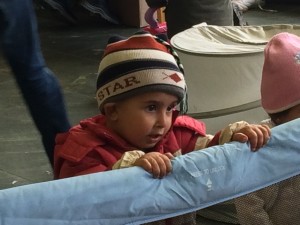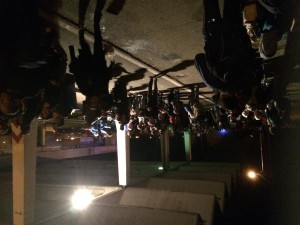It has been a very strange experience today watching the town of Presevo Serbia return to normalcy. Yesterday morning we were inundated with the press of people seeking refugee. Before they can find that refuge in Europe, they must cross through Seria, Croatia, Hungary and then into Austria.
The Serbian government, reportedly at the insistence of the Europol police, have been implementing a strict screen process upon entry into Serbia. First their luggage is scanned (like airport security) at the border. Then, in Presevo they are surveyed, interviewed, fingerprinted and photographed as part of the registration process. This is the process that caused the Main Street of Presevo to become a series of holding pens for thousands of people. Thirsty, hungry, tired, scared, confused – this must have been a hellacious experience for them. Some people spent multiple days in these pens euphemistically called queues. They were constantly under the watchful and controlling eyes of a large contingent of police including the elite special forces with their riot gear and automatic weapons.
Things were amazingly peaceful and cooperative really. Police generally showed restraint and even caring. Most of the people in the pens displayed patience and courtesy. There were a few incidents Thai witnessed where the crowd pushing caused the barriers to burst and the police to forcefully respond. But my sense was that no one wanted violence and all worked to maintain order.
Yesterday afternoon something shifted and everything became more a orderly flow. By evening the queue had shrunk and by 1 am, it had disappeared entirely. This morning all was quiet but the area looked like a hurricane had hit. There was garbage everywhere and metal barriers forming empty enclosures.
Then a miraculous transformation occurred as local town’s people, volunteers and aid workers worked together to clean up and return the town to normal. Many volunteers packed up and moved on to the next hot spot while others of us shifted into a next phase of this work. For Jenny and me this meant cleaning and equipping the volunteer house we have been staying in to be able to more comfortably house more volunteers in the future. It also involved unloading a huge UNHCR tent and placing it into storage so that the “next time” the enclosures can be sheltered from sun and rain and we also put 200 new cots into storage for future use.
Late this afternoon, I realized that the town was back to normal when I saw a few cows being being led up Main Street, a more typical scene for a rural Sebian town than pens full of human livestock. The street was clean of all garbage. The barricades were discretely moved to the side of the road. The street was again open to traffic. A large police presence remained but they were relaxed and inconspicuous. Town residents were out cleaning the areas in front of their homes and businesses and there was lots of friendly conversation and cooperation.
Back to normal? That was my impression but I wonder if it is really possible to return to an old sense of normal. What is normal anyway? And how has this community and those of us outsiders that have been hosted here – how have we been changed by this experience? In this modern world, maybe the new normal is the ability to adapt and to welcome the outsider and to be resilient enough to roll up the collective sleeves, clean up the mess and be ready for the next challenge.
I find it tempting to consider this respite to be the end of the crisis. But it seems that it might just be a temporary lull caused by turbulent seas and storms preventing the crossing from Turkey to Greece. It is possible that the flow will resume or even intensify at any time. Bombs are still being dropped in Syria. The Taliban is on the offensive in Afghanistan. War is making it unsafe for families to live peacefully in much of the Middle East. So, people will continue to seek refuge and this respite may soon seem like a dream.
And I wonder how I have been changed by this experience. How will I be unable to return to “normal”? What are the learnings that I am taking from this experience? It is still too early for me to be clear on my personal learnings but I suspect that my heart has been stretched. Many times in recent days I would be unable to talk without crying. This feels like a gift, like my capacity to feel and to care and to love has been expanded. I also think that I learned a lot about the interactions of police and crowds and I have a much deeper appreciation for the challenges of police and a respect for those that I witnessed practicing restraint and caring while also enforcing control. I also have another personal experience of order emerging from chaos and some of the negative responses to attempts at imposing control. I’m in the process of learning more about what I have to offer in such crisis situations. When there is such pressure to do something, I am realizing that my presence, my state of being can be more powerful and more of a gift than anything I could do. There are also nascent learnings about the role of egoic and attention-getting motivations and actions. I need to spend more time in reflection upon my own motivations and how I can be more selfless and compassionate in my service. What a gift it is to be here and engaged in such powerful and important learning.

 Follow
Follow
